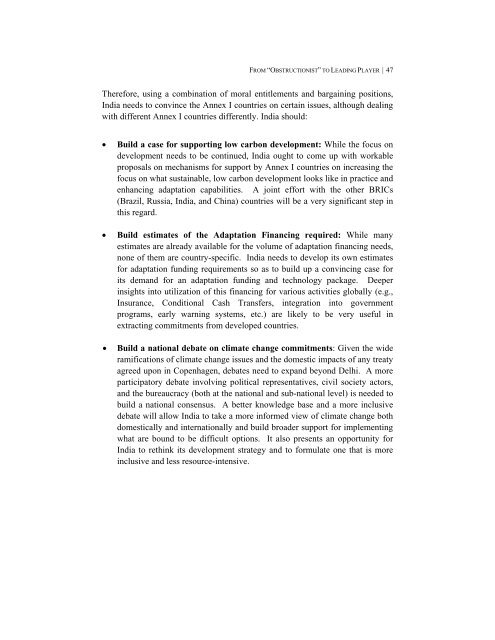Indian Climate Policy - Global Commons Institute
Indian Climate Policy - Global Commons Institute
Indian Climate Policy - Global Commons Institute
Create successful ePaper yourself
Turn your PDF publications into a flip-book with our unique Google optimized e-Paper software.
FROM “OBSTRUCTIONIST” TO LEADING PLAYER | 47<br />
Therefore, using a combination of moral entitlements and bargaining positions,<br />
India needs to convince the Annex I countries on certain issues, although dealing<br />
with different Annex I countries differently. India should:<br />
<br />
<br />
<br />
Build a case for supporting low carbon development: While the focus on<br />
development needs to be continued, India ought to come up with workable<br />
proposals on mechanisms for support by Annex I countries on increasing the<br />
focus on what sustainable, low carbon development looks like in practice and<br />
enhancing adaptation capabilities. A joint effort with the other BRICs<br />
(Brazil, Russia, India, and China) countries will be a very significant step in<br />
this regard.<br />
Build estimates of the Adaptation Financing required: While many<br />
estimates are already available for the volume of adaptation financing needs,<br />
none of them are country-specific. India needs to develop its own estimates<br />
for adaptation funding requirements so as to build up a convincing case for<br />
its demand for an adaptation funding and technology package. Deeper<br />
insights into utilization of this financing for various activities globally (e.g.,<br />
Insurance, Conditional Cash Transfers, integration into government<br />
programs, early warning systems, etc.) are likely to be very useful in<br />
extracting commitments from developed countries.<br />
Build a national debate on climate change commitments: Given the wide<br />
ramifications of climate change issues and the domestic impacts of any treaty<br />
agreed upon in Copenhagen, debates need to expand beyond Delhi. A more<br />
participatory debate involving political representatives, civil society actors,<br />
and the bureaucracy (both at the national and sub-national level) is needed to<br />
build a national consensus. A better knowledge base and a more inclusive<br />
debate will allow India to take a more informed view of climate change both<br />
domestically and internationally and build broader support for implementing<br />
what are bound to be difficult options. It also presents an opportunity for<br />
India to rethink its development strategy and to formulate one that is more<br />
inclusive and less resource-intensive.
















